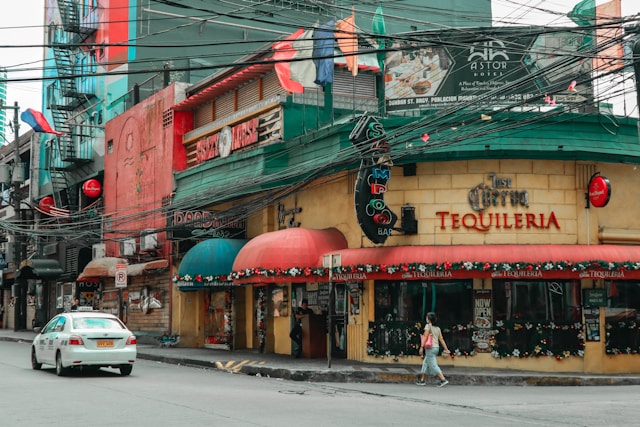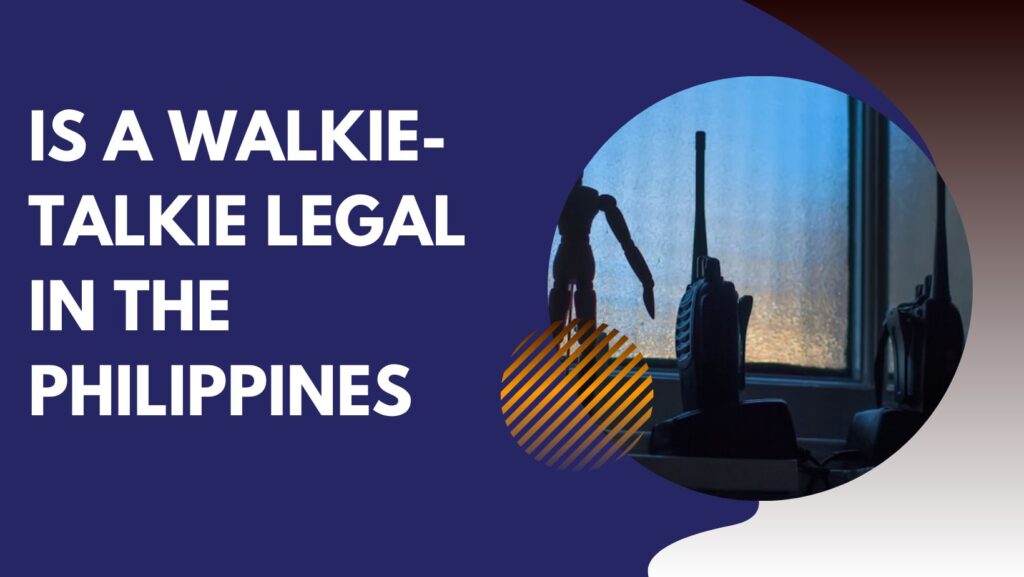Learn about Is a walkie-talkie legal in the Philippines. Learn rules, permitted frequencies, NTC-approved radios, and safe, penalty-free usage guidelines.
A walkie-talkie is a small, handheld, two-way radio, which enables people to communicate with each other without wires. It operates in the transmission and reception of voice messages by radio frequency. The common users of walkie-talkies are:
- Security guards
- Event organizers
- Hikers and campers
- Families in malls or amusement parks
- Businesses like hotels and construction sites
They are fast and direct without the requirement of mobile data, Wi-Fi, or cell phone connections.
Is a walkie-talkie legal in the Philippines?
Yes, walkie-talkies are legal in the Philippines, provided that you use NTC-approved units and do not use frequencies that are not authorized. Violation through the use of prohibited bands or high-power radios may result in punishments. To remain in the clear and not to pay fines or lose something, always make sure that you are not breaking the NTC regulations.

Benefits of using walkie-talkies legally in the Philippines
1. Clear and Reliable Communication
NTC-approved walkie-talkies are good to make sure that your device uses safe and interference-free frequencies and thus has clearer, more stable communication.
2. Avoids Fines and Penalties
Legal walkie-talkies are used to avoid careless issues like seizure, fines by NTC, and avoidable criminals like legal hassle, which is associated with unlicensed or high-power radios.
3. Protects Emergency Channels
Approved frequencies are used to make sure that the communication does not interfere with police, medical, aviation, and disaster-response communications- keeping the population safe.
4. Better Performance on Allowed Frequencies
NTC-approved radios have been designed to work in legal public or business channels and have a greater range, stable signals, and are more reliable.
5. Safe for Personal and Business Use
Families, hikers, event organizers, hotels, and security teams can communicate safely without the fear of contravening radio laws.
6. Supports Coordinated Operations
Companies with radios that are licensed and used properly will have an easier teamwork implementation, response, and coordination of security, events, and field operations.
Penalties for Using Illegal Walkie-Talkies
Using unlicensed or restricted radios can result in:
- Confiscation of the device
- Fines from the NTC
- Possible legal action for repeated violations
It’s important to follow the rules to avoid problems.
Why Does the Philippines Regulate Walkie-Talkies?
Walkie-talkies are controlled by the government due to the following reasons:
✔ To protect emergency frequencies
The Philippines controls walkie-talkies to secure important emergency frequencies of the police, firefighters, medical crews, and airports, as well as the military. This guarantees that these groups are able to communicate well in times of emergencies without being influenced in a negative way.
✔ To prevent interference
The air traffic control, maritime communications, as well as government dispatch systems can be interfered with by illegal or high-powered walkie-talkies. The regulation ensures that signal interference that might disrupt the operations, safety, and critical communications within the various government departments is avoided.
✔ For public safety
Walkie-talkie control will guarantee the safety, clarity, and reliability of all the communications. Regulation of frequencies helps the government to minimize the chances of confusion, interrupted signals, and communication breakdowns in times of emergency and the everyday running of activities.
✔ To manage limited radio frequencies
Radio frequencies are scarce resources. Regulation also assists in laying the channels in an appropriate way, avoiding overcrowding, and providing fair and organized usage, allowing businesses, emergency teams, and the citizens to communicate without signal conflicts and interruptions.
Tips for Safe and Legal Use
- Determine whether you have a walkie-talkie that is FRS or license-free.
- Do not adjust or raise the power of the antenna.
- Do not use the frequencies that are not intended to be used by the public.
- When it is business usage, then obtain adequate NTC permits.
Walkie-Talkies That Are Legal Without a License
1. PMR446 Walkie-Talkies
Low-powered walkie-talkies, PMR44,6, consume 0.5 watts of power and offer a small range of communication. They are not required to have an NTC permit to be used by the population in the Philippines, which makes them easy and convenient.
2. FRS Walkie-Talkies
FRS walkie-talkies are used on low power up to 2 watts and are more likely used on a personal or family scale. In the Philippines, they are not under license roprovidedhey meet the technical standards approved by NTC.
Walkie-Talkies That Require an NTC License
There are more powerful walkie-talkies that are not allowed to be used without the NTC’s permission. Businesses, organizations, or professionals usually use these.
1. UHF/VHF Radios (High-Power Radios)
UHF and VHF radios have higher power requirements and also have a greater range, and would be relevant to businesses, security, and large operations. Such radios must have an NTC license so that they do not interfere with the regulated communication channels.
2. GMRS Radios (General Mobile Radio Service)
GRMS radios have better signal and range of communication and are often utilized in coordination with professionals or outdoor activities. Users are required to obtain an NTC license in order to legally use them in the Philippines due to their higher power.
3. Programmable Radios (Baofeng, etc.)
Radios such as Baofeng that are programmable can also tune to various frequencies, such as restricted frequencies. As they have the potential to be interfered with, they must be approved by NTC and licensed before legal use in the Philippines.
Why Some Walkie-Talkies Require Licensing
The NTC controls radio frequencies to prevent interference with:
- Emergency services
- Police and military channels
- Aviation and marine communication
- Broadcast systems
Using high-power or unapproved radios without a license can cause serious disruptions.
Who Commonly Uses Licensed Walkie-Talkies?
Businesses and organizations that need strong or long-range communication, such as:
- Security agencies
- Hotels and resorts
- Construction companies
- Transportation services
- Event management groups
- Schools and universities
- Emergency response teams
- LGUs and private organizations
Tips for Legal Walkie-Talkie Use
- Buy only NTC-approved models.
- Use 0.5W FRS when personal use.
- In the case of business, obtain the necessary NTC license.
- Do not change the device to give more power.
- Do not use walkie-talkies on a police, aviation, or emergency radio

FAQs
1. Can I use walkie-talkies for personal use?
Yes, walkie-talkies can also be used personally, provided that they are NTC-approved FRS models, with a power of 0.5 watts or less, that need no license.
2. Can I import walkie-talkies from abroad?
Yes, it is possible to import walkie-talkies, although they should comply with the NTC regulations. Devices that operate at illegal frequencies or that have high power could be seized or have to be licensed.
3. Who regulates walkie-talkies in the Philippines?
NTC regulates walkie-talkies in the Philippines, where legal frequencies, approved devices, correct licensing, and safe radio communication are provided in the country.
Conclusion
In the Philippines, walkie-talkies are legal provided that they are operated on licensed frequencies and that the devices are of NTC-compliant frequency. When the rules are followed, communication will be sa,fe and he/she will not be interrupted. Just ensure that you check the NTC guidelines to prevent fines, signal problems, or confiscation of the device.

